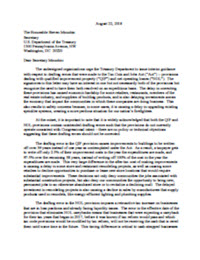A broad-based business coalition that includes The Real Estate Roundtable urged Treasury Secretary Steven Mnuchin on Wednesday to issue guidance clarifying certain provisions included in tax overhaul legislation enacted last year — including the cost recovery period for qualified improvement property (QIP). ( Coalition letter , Aug. 22)
 |
A broad-based business coalition that includes The Real Estate Roundtable urged Treasury Secretary Steven Mnuchin on Wednesday to issue guidance clarifying certain provisions included in tax overhaul legislation enacted last year — including the cost recovery period for qualified improvement property (QIP). (Coalition letter , Aug. 22) |
- An unintentional drafting mistake in the tax law has resulted in a significantly longer 39-year cost recovery period for new, qualified nonresidential interior improvements. Congress intended to allow the immediate expensing of qualified improvements, or provide a 20-year recovery period in the case of taxpayers electing out of new limitations on the deductibility of business interest.
- The drafting error affects leasehold improvements, expenditures made to improve common spaces in shopping centers and office buildings, and other interior improvements to nonresidential structures. The longer cost recovery period effectively increases the after-tax cost of upgrading and improving commercial real estate. ("Correcting the Drafting Error Involving the Expensing of Qualified Improvement Property " – The Tax Foundation , May 30)
- The August 22 letter includes 283 signatories, who state the delay in correcting the QIP provision is delaying some store and restaurant remodeling projects, and causing some retailers to decline opportunities to purchase or lease new store locations that would require substantial improvements.
- The coalition letter further explains, "These decisions not only deny communities the jobs associated with substantial construction projects, but also deny our communities the opportunity to bring new, permanent jobs to an otherwise abandoned store or to revitalize a declining mall. The delayed investment in remodeling projects is also causing a decline in sales by manufacturers that supply products used in remodels, like energy-efficient lighting and plumbing supplies."
- The coalition urges Secretary Mnuchin "to issue guidance that will facilitate the intent of the law and eliminate the imposition of large additional tax compliance and accounting burdens on taxpayers, as well as associated tax enforcement burdens on the Internal Revenue Service."
- Last week, all Republican members of the Finance Committee and Chairman Orrin Hatch (R-UT) wrote to Treasury and the IRS, requesting "guidance that is consistent with the congressional intent" of the new tax law regarding QIP expensing and two other tax policy areas. (Roundtable Weekly, Aug. 17)
Roundtable President and CEO Jeffrey DeBoer stated, "In 2015, Congress voted overwhelmingly to permanently extend the 15-year recovery period for certain property improvements. By passing tax reform, Congress intended to consolidate those changes. Treasury should now use its authority to provide taxpayers with relief until a technical corrections bill is enacted. Treasury guidance will remove taxpayer uncertainty, unlock investment, and spur job-creating property upgrades and renovations."
